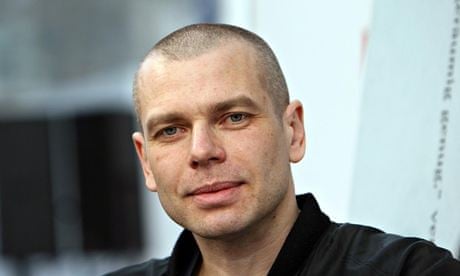I was eating breakfast in a hotel, reading a book, when the German illustrator Axel Scheffler (of Gruffalo fame) sat down opposite me. "Do you know about Herrndorf?" he asked. I shook my head. "He got cancer," he said. "Wrote a blog about it. Died." "How sad," I said. "Killed himself," said Scheffler. He had my full attention now. "Shot himself." Pause. "In the head."
He'd asked about Herrndorf because he'd seen I was reading the American-English translation of Herrndorf's Tschick, with the English title Why We Took the Car. I'd assumed "Tschick" to be the equivalent of our "Twoc" (Taking Without Owner's Consent), but it turned out it was short for Tschichatschow, the name of one of the two teenage-boy protagonists.
I have been irregularly reviewing children's books for the Guardian for more than 10 years and, if memory serves – with the exception of Tove Jansson's Moomin books – this is the first book I've read in translation for review. The lack of translated children's (in this case Young Adult) fiction is our loss. Fellow German Cornelia Funke aside, I am hard-pressed to think of other contemporary foreign children's authors available in English (though I know the Pushkin imprint is trying to redress this). Tim Mohr has done an excellent job with Why We Took the Car. Its American stoops and faucets and pants for trousers mixed with euros and kilometres-an-hour make for an interesting hybrid.
The story seems a simple one – two 14-year-olds sort of borrow a car – but the execution is beautiful. From the outset, it is clear that Mike is a square peg in a round hole. At school he is aloof and seemingly disconnected. At home, he has to deal with an alcoholic mother and a father who appears to be having a rather obvious affair.
Mike's crazy about Tatiana, a girl in his class, but is one of the few classmates who doesn't get invited to her party. He has done an amazing pencil drawing of Beyoncé for her but ends up tearing it to pieces. Tschick – the new Russian kid at school, who sometimes turns up reeking of booze – insists that they drive to Tatiana's house and give her the reconstituted gift. They arrive in a beaten-up old Lada that Tschick sometimes uses, borrowing it without permission from the street but always bringing it back. Until now. Until the road trip.
For much of the time, little happens. There are no big police chases (except for one involving a bicycle) and none of the more obvious rites of passage. But they do meet some interesting people in interesting places and, because it's seen through Mike's eyes, not too much is explained. Are they at some sort of religious community now? Is this scene set in a disused quarry? How and why did this girl get here?
This adds a very real, yet, at the same time, surreal edge to proceedings. In the same way that Frank McCourt's memoir Angela's Ashes related events as they were experienced at the time, with little, if any, adult reflection, we watch events unfold as Mike perceives them. The result is insightful and funny.
After finishing Why We Took the Car, I investigated Scheffler's breakfast revelations. Sadly, they were true. Diagnosed in 2010 (the year this book was originally published), Herrndorf shot himself in August 2013. Apparently, one of the first things he did after being told he had cancer was get himself a gun. He said it was his link to reality and his exit strategy. His was an extraordinary mind.

Comments (…)
Sign in or create your Guardian account to join the discussion